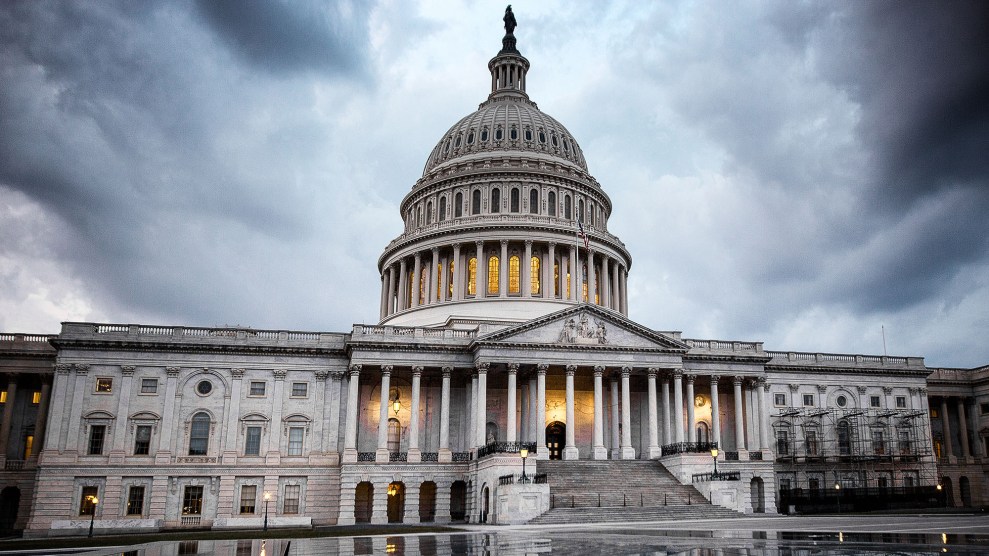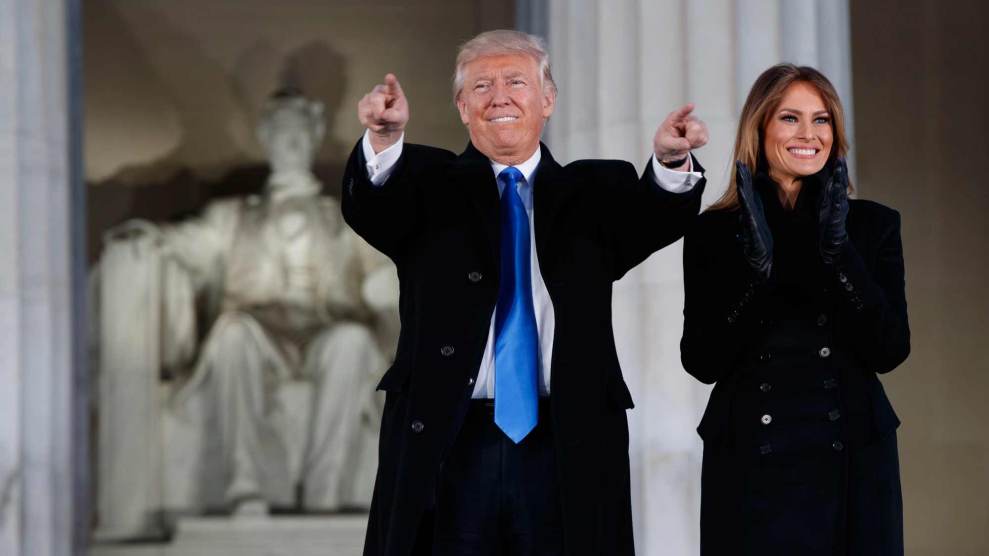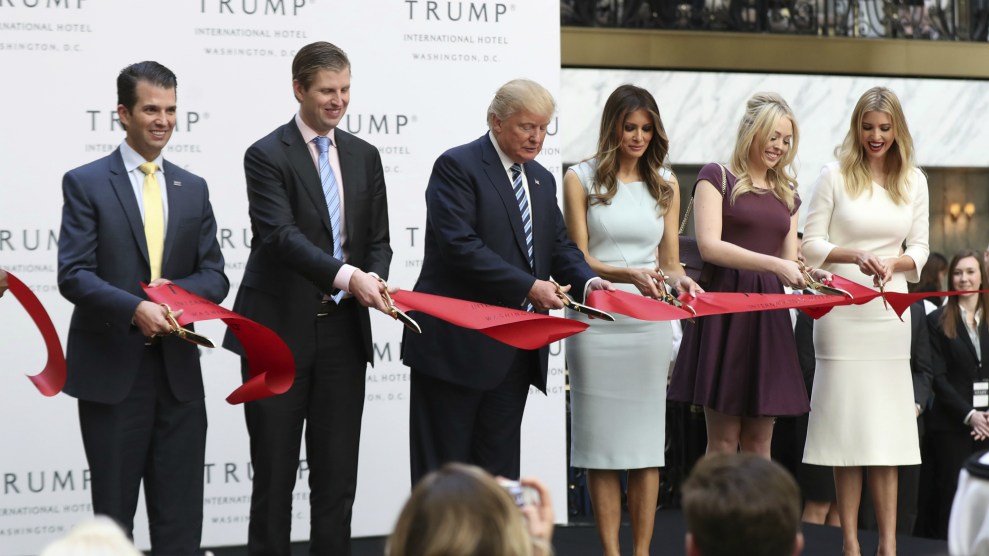
uschools/iStock
President Donald Trump’s first weeks in office, a head-spinning blur of policy shifts and controversial executive orders, has worried critics—some of whom say that a historic emergency is underway.
Politicians like Virginia Rep. Don Beyer and Senate Minority Leader Charles Schumer have said in recent days that the United States is in the middle of a constitutional crisis. They argue that the Constitution, the framework for the balance of power in government, has failed—or at minimum is in jeopardy.
But what does that mean, exactly? How worried should we be?
Mother Jones talked to two constitutional scholars who say we are not yet in a crisis. But their cautious assessments were often peppered with bleak language.
Congress “is broken. I am not sure if it can be fixed,” said Ronald Krotoszynski, a professor and expert on constitutional law at the University of Alabama School of Law. We need Congress to play an active oversight role—a check against abuses of executive authority, he said: “And although the federal courts function very well, they are the weakest branch and simply cannot serve as the only check on lawless executive actions.”
Meanwhile, Jack Balkin, a Yale Law School professor who has studied constitutional crises, could not think of a similar moment in US history. “We are in uncharted waters,” he said.
Here’s how Krotoszynski and Balkin view the Trump administration’s moves so far—and what worries them the most.
What exactly is a constitutional crisis, anyway?
A constitutional crisis occurs when there is a serious danger that the Constitution is about to fail at its central task, which is to keep political disagreements from breaking down into anarchy, violence, or civil war, said Balkin, a Knight Professor of Constitutional Law and the First Amendment at Yale Law School.
Krotoszynski, the University of Alabama law professor, gave a broader definition. In a strict sense, he said, it means that we face a situation for which the Constitution, as interpreted by the Supreme Court, fails to provide a clear answer to a pressing question of governance.
“In a more general sense, however, it means that one branch of government has gone off the rails,” he said—that it’s acting in ways inconsistent with the text of the Constitution or well-established constitutional conventions.
How are those definitions different from how people have been talking about constitutional crises of late?
Sometimes when people call something a constitutional crisis, Balkin said, they really mean that there is a heated dispute about how to interpret the Constitution or people are upset at what government officials have done.
And some crises are really what Harvard Law School professor Mark Tushnet has called “constitutional hardball,” Balkin said. This is when political actors stretch or defy unspoken rules of fair play that were not clearly legally required. As an example of this, he cited Senate Republicans’ refusal to allow a confirmation hearing for anyone President Barack Obama nominated to the Supreme Court during his last year in office.
Actions that cannot self-correct through the mechanisms of the branches of government are the most problematic, Krotoszynski said. If a federal court can block or prevent an unlawful action, the president’s actions are unlawful, but they do not represent a constitutional crisis.
Could Trump’s actions connected to the “Muslim ban” executive order lead to a constitutional crisis?
A federal judge in Seattle has issued a nationwide injunction that stops government officials from enforcing Trump’s executive order banning people from seven majority-Muslim nations from entering the United States. The Trump administration says it is following the existing orders from federal judges, which apply to specific jurisdictions as opposed to the entire country. Krotoszynski said it will be interesting to see how the administration responds to this injunction, which has national scope—but we haven’t reached constitutional crisis territory on this particular issue. “Happily, we are not there—at least yet,” Krotoszynski said.
Balkin said it’s important to distinguish between mismanagement and overreach. “If President Trump ordered executive branch officials to defy judicial orders—and they did so, not merely in isolated instances out of confusion, but deliberately and consistently—that could precipitate a constitutional crisis.”
The Justice Department’s appeal, filed over the weekend, is not the same as defying the courts, Balkin added.
Are there other actions by Trump that may lead to a constitutional crisis?
Yes, said Krotoszynski, who singled out the executive order telling agencies that they must repeal two regulations for every new one they make as “the most broadly lawless action” the administration has taken so far. “This is insane.”
Congress writes the laws that tells agencies like the Environmental Protection Agency how to regulate. The 2-for-1 requirement Trump created has effectively rewritten every federal regulatory enactment, Krotoszynski argues. The president can propose bills that amend existing laws, but he cannot amend laws on a whim. This appears to be the net effect of the 2-for-1 regulation, he said.
If agencies pay attention to it, and disregard court orders telling them to take their marching orders from the US Code, then we have a constitutional crisis. “Congress itself should be up in arms about it,” Krotoszynski said, “but isn’t.”
Trump’s business holdings, which many experts say is a violation of the Emoluments Clause of the Constitution, is also an area that could lead to a crisis, he added.
What other moments in American history can be considered constitutional crises that are more serious than the Trump administration actions people are debating now?
The examples cited by Balkin and Krotoszynski were from the nation’s darkest days: the Civil War and the years right before and after the signing of the Constitution.
Krotoszynski said 1781 to 1789 was a particularly dark period. “The Articles of Confederation were a dismal failure and the nation was melting down—economically and politically,” Krotoszynski said, referring to the document that was the first Constitution of the United States. The Constitution of 1787 was a “Hail Mary” effort to reboot the government, he said.
“The Constitution broke down at the end of 1860, resulting in the deaths of approximately 2 percent of the population of the country,” Balkin said, adding that would be roughly the equivalent of 6 million people today. A few weeks “into the Trump administration, our situation is not close to being as dire as that.”














